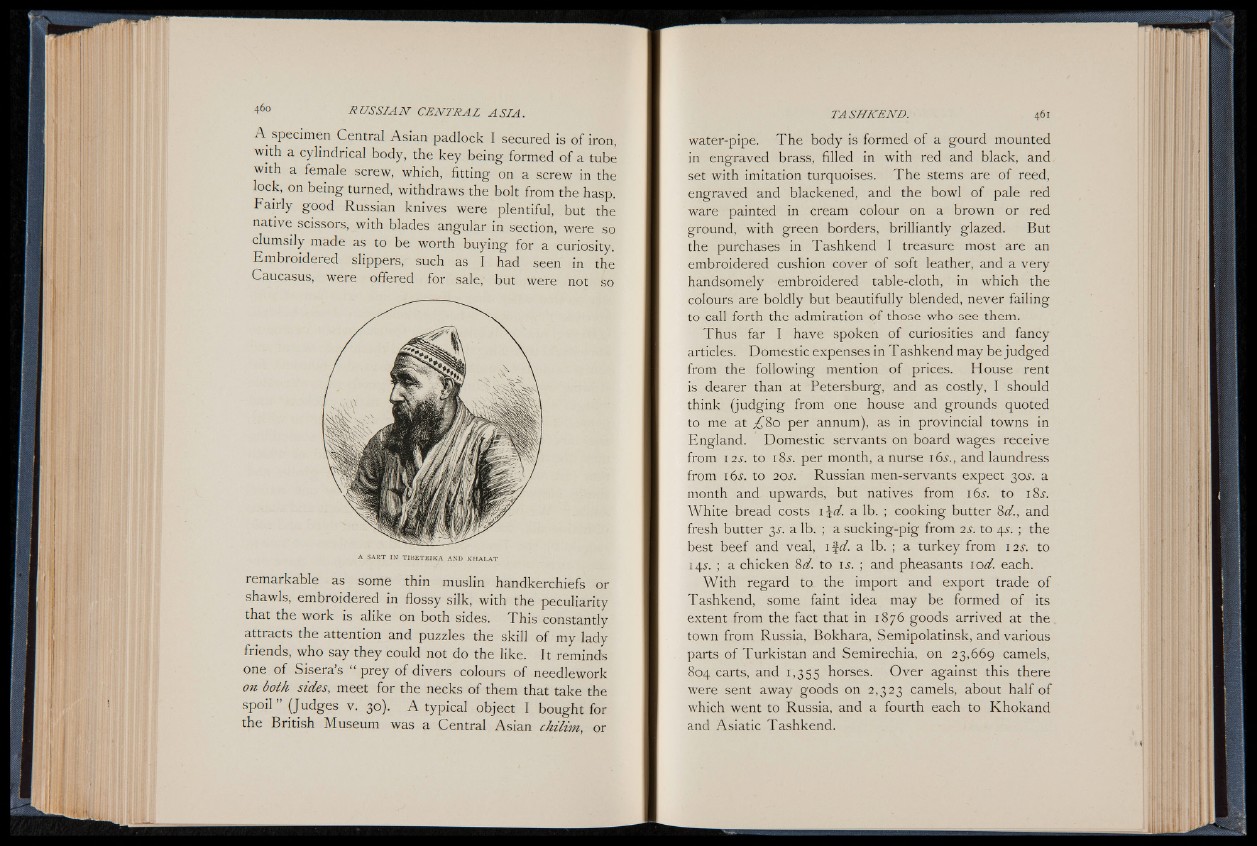
A specimen Central Asian padlock I secured is of iron,
with a cylindrical body, the key being formed of a tube
with a female screw, which, fitting on a screw in the
lock, on being turned, withdraws the bolt from the hasp.
Fairly good Russian knives were plentiful, but the
native scissors, with blades angular in section, were so
clumsily made as to be worth buying for a curiosity.
Embroidered slippers, such as I had seen in the
Caucasus, were offered for sale; but were not so
A SART IN TIBETEIKA AND KHALAT
remarkable as some thin muslin handkerchiefs or
shawls, embroidered in flossy silk, with the peculiarity
that the work is alike on both sides. This constantly
attracts the attention and puzzles the skill of my lady
friends, who say they could not do the like. It reminds
one of Sisera’s “ prey of divers colours of needlework
on both sides, meet for the necks of them that take the
spoil ” (Judges v. 30). A typical object I bought for
the British Museum was a Central Asian chilim, or
water-pipe. The body is formed of a gourd mounted
in engraved brass, filled in with red and black, and
set with imitation turquoises. The stems are of reed,
engraved and blackened, and the bowl of pale red
ware painted in cream colour on a brown or red
ground, with green borders, brilliantly glazed. But
the purchases in Tashkend I treasure most are an
embroidered cushion cover of soft leather, and a very
handsomely embroidered table-cloth, in which the
colours are boldly but beautifully blended, never failing
to call forth the admiration of those who see them.
Thus far I have spoken of curiosities and fancy
articles. Domestic expenses in Tashkend may be judged
from the following mention of prices. House rent
is dearer than at Petersburg, and as costly, I should
think (judging from one house and grounds quoted
to me at £%o per annum), as in provincial towns in
England. Domestic servants on board wages receive
from 12s. to 18s. per month, a nurse 16x., and laundress
from 16s. to 20s. Russian men-servants expect 30s. a
month and upwards, but natives from 16s. to 18s.
White bread costs 1 \d. a lb. ; cooking butter 8d., and
fresh butter 3s. a lb. ; a sucking-pig from 2s. to 4s. ; the
best beef and veal, i f d. a lb. ; a turkey from 12s. to
14s. ; a chicken 8d. to is. ; and pheasants 10d. each.
With regard to the import and export trade of
Tashkend, some faint idea may be formed of its
extent from the fact that in 1876 goods arrived at the
town from Russia, Bokhara, Semipolatinsk, and various
parts of Turkistan and Semirechia, on 23,669 camels,
804 carts, and 1,355 horses. Over against this there
were sent away goods on 2,323 camels, about half of
which went to Russia, and a fourth each to Khokand
and Asiatic Tashkend.